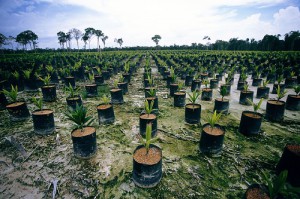Here at RAN the agribusiness campaign is hard at work pressuring US agribusiness companies, with a focus on the massive privately held company Cargill, to stop their dirty and dangerous practices of developing oil palm plantations in the rich tropical rainforests of Indonesia, Malaysia, and Papua New Guinea.
Cargill has a total of five oil palm plantations in Southeast Asia, divided into more than twenty estates that have been carved out of the world’s most diverse and carbon rich rainforests.
Because Cargill is both the largest supplier of palm oil to the US from Indonesia and the largest importer of palm oil into the US, we at RAN have a strong position to push the multinational to clean up their actions and adopt a global forest policy. Our impact over the past few months has been seen in the company agreeing to a series of three meetings with RAN running up to the Round Table on Sustainable Palm Oil in November.
But as with all the world’s natural resources, China has increasingly become the most dominant oil palm consumer nation. Too cold and dry to produce the crop on their own soil, Chinese business and government has turned to Indonesia to feed their demand for the cheap cooking oil and input for processed foods with so many ecological and social consequences.
Sime Sarby, the Malaysia palm oil processor, has just announced new plans to expand their factories in China in response to rapidly increasing demand, and their CEO expect Chinese demand to increase 100 percent over the next decade.
Efforts to increase the uptake of less harmful palm oil are finally beginning to show some market impact. Since 2008, 19 percent of crude palm oil sold on the global market carried the label of ‘sustainable palm oil’ from the RSPO, the foremost certification criteria for palm oil.
Granted, there are real concerns over the RSPO being used as no more than ‘greenwashing’ of dirty palm oil. Case in point is the recent announcement by New Britain Palm Oil, an oil palm poducer with serious negative ecological and social impacts in Papua New Guinea, that they will sell $100 million of “sustainable oil palm” to the producer of Nutella.
But I would still argue that this 19 percent uptake of certified palm oil is at least a very small, and vary incremental step, in the right direction for the oil palm industry.
But Chinese importers and oil palm producers have shown little interest in increasing the sustainability of their oil palm, and Chinese consumers have not yet placed any demands on their domestic marketplace.
Since 2005, Chinese oil palm companies have been lobbying to create a massive palm oil development in the heart of Borneo’s last remaining tropical forests. Intense criticism from environmental and community rights groups has limited Borneo’s ‘Oil Palm Mega Project’, but the threat remains.
Its clear, to effectively slow forest destruction in Indonesia, new policy and advocacy strategies are needed to push China’s oil palm lobby towards a future of responsible oil palm development and engage Chinese consumers.
David Gilbert is a Research Fellow at RAN. He has worked in the tropical forests of the Amazon and Indonesia, with a special focus on forest conservation and indigenous rights.
He can be reached at davidgilbert@ran.org
